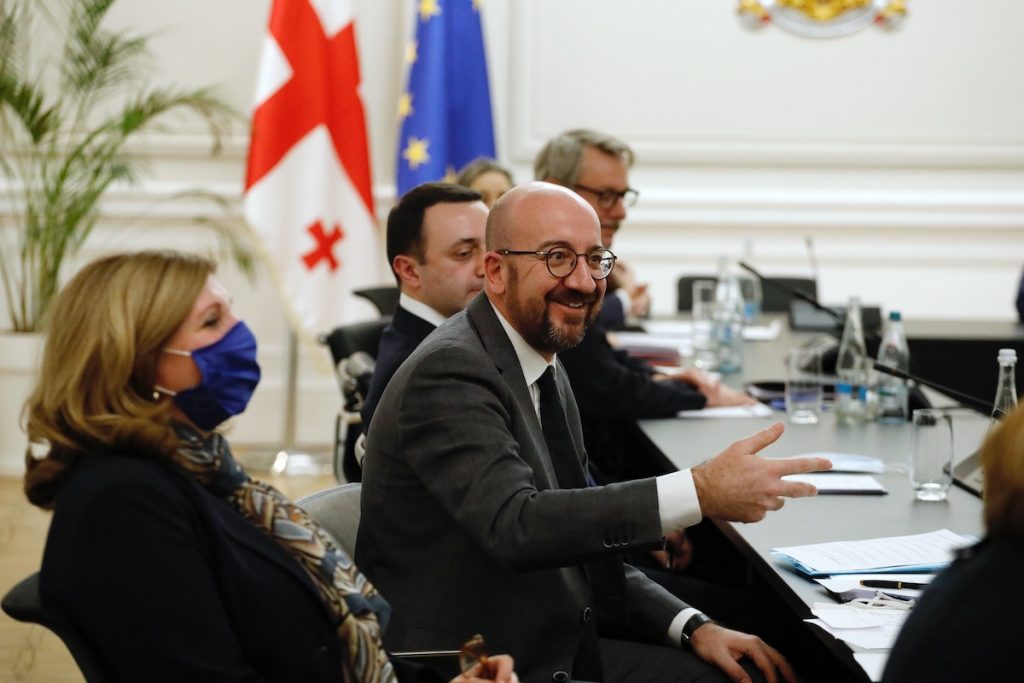Georgian gov't, opposition standoff at an end? What's in the newly signed agreement
European proposals: how to get out of the crisis in Georgia
An end to Georgia’s protracted political crisis is on the horizon after the ruling party and several opposition parties have signed an agreement facilitated by the Council of Europe.
Since March 2021, the dialogue has been facilitated by Charles Michel and his plenipotentiary Christian Danielson.
The agreement has so far been signed by the ruling Georgian Dream party and the opposition parties Lelo, Strategy Aghmashenebeli, Girchi, Girchi – More Freedom and the Republican Party.
Only two parliamentary opposition parties, the United National Movement and European Georgia, have not signed the document. However, individual and former members of these parties have put their signatures, including Salome Samadashvili, Khatuna Samnidze and David Bakradze.
European Council President Charles Michel presented the new package of proposals in Tbilisi on April 18 to the opposing political forces in Georgia, detailing two points that the opposition and the authorities in the country most of all dispute: the release of political prisoners and early parliamentary elections.
What exactly does the document, called ‘The Future Path for Georgia’, propose? How does it differ from the previous proposal presented to the opposition by the Special Representative of the President of the European Council on March 31?
What are the main arguments about the compromise in Georgia? A brief analysis.

- European Parliament ‘disappointed’, proposes suspending financial aid to Georgia
- Politicised justice, attack on media, electoral violations – Georgia in US State Department report
Five points of compromise
1. Politicized justice
One of the main points, which the opposition insisted on, is that the two arrested opposition leaders Nika Melia and Giorgi Rurua are innocent and must be released. Their names are not directly mentioned in the document. However, it is said that “in the interests of political stability in Georgia” the parties who signed the document must “respond to two cases that are perceived as politicized justice” within a week.
The condition necessary for the entry into force of this provision is that all who sign the document must return to work in parliament.
Terms: Within a week after signing the document.
2. Ambitious electoral reform
● The next parliamentary elections will be fully proportional (according to party lists). The threshold for the next two elections will be two percent. A group from one party of at least four MPs will be able to form a parliamentary faction, which may include MPs from other parties.
● Local government elections scheduled for autumn 2021 will be held according to the following system. In five large cities (Tbilisi, Kutaisi, Batumi, Rustavi, Zugdidi), seats will be distributed between proportional and majority mandates according to the 4/1 principle. Elsewhere in the country, this proportion will be 2/1. In Tbilisi, the electoral threshold will be 2.5 percent, in all other places – three percent.
● The chairman of the Central Election Commission will be elected by 2/3 of the votes of the deputies of parliament. The deputy chairman of the CEC must be a representative of the opposition party. Changes were also proposed to the rules for recruiting the CEC, district and precinct commissions.
Timeline: Discussion of the electoral bill should be resumed as soon as opposition MPs start working in parliament.
Within two weeks after the signing of the agreement, the bill should reflect all the changes that are recorded in Michel’s document. This updated document should then be sent to the OSCE Office for Democratic Institutions and Human Rights and its conclusions obtained.
Parliament must pass these changes before the fall local elections.
3. Rule of law / judicial reform
The ambitious judicial reform must be adopted within the current parliamentary term, as a result of widespread cooperation between the government and the opposition.
Among the main points are a change in the rule for the appointment of judges of the Supreme Court and an in-depth reform of the High Council of Justice.
The changes will affect the Prosecutor General’s Office as well. In particular, the appointment of the next Attorney General must be approved by a qualified majority of MPs.
The document also contains several important technical details regarding the appointment of the attorney general.
Timeline: Discussion of these issues begins as soon as opposition parties enter parliament. The prepared draft amendments must be sent to the Venice Commission by July 1 for conclusion. The first vote will take place in parliament during the fall session of 2021. Parliament must approve these changes no later than the spring 2022 session.
4. Distribution of power in parliament
Opposition representatives are to chair five parliamentary committees.
Opposition MPs will lead parliamentary delegations representing Georgia in important international forums, in particular in the Parliamentary Assembly of the Council of Europe.
Timeline: The process of redistributing powers in parliament should begin within a week after signing, so that the changes take effect immediately after the convening of the autumn session of 2021.
5. The decision on early parliamentary elections will depend on the results of local elections
Early parliamentary elections in Georgia will be announced if the ruling Georgian Dream party receives less than 43 percent of the proportional votes in local elections in the fall of 2021.
The parties should take into account the OSCE / ODIHR assessment, which assessed the October 31 parliamentary elections as “held in a competitive environment and, in general, respecting fundamental freedoms. However, widespread accusations of pressure on voters must also be recognized; blurring the boundaries between the ruling party and the state; refusal to consider most complaints on a formal basis ”.
The parties acknowledge that they assess the 2020 elections differently and agree to start working in parliament, as well as to participate in the upcoming elections on the basis of the electoral reform agreed above, in the interests of political stability in Georgia and in order to implement this agreement.


















